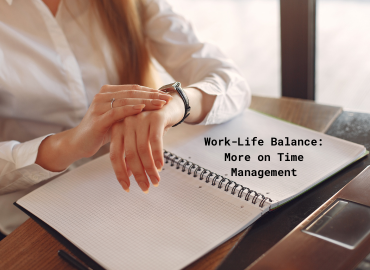Work-Life Balance: More on Time Management
Recently we’ve been blogging about work-life balance: what it means, how to achieve a healthy balance, and how to recognize an imbalance. Read our other entries here, here, and here. A healthy work-life balance has a lot to do with taking control of your time. It can be hard to do, and there will be ways in which your obligations can’t be altered and will demand whatever time they need. The important thing is to claim your time when and where you can.
Building your time management skills is a method of self-empowerment to make choices, and once you start looking for areas to customize, you’ll find more. Even small adjustments can make a big difference, maybe even a ripple effect. It also sets into motion a habit of looking for opportunities to make adjustments so your life can be more productive, more comfortable, more peaceful, more creative, etc.
A healthy work-life balance is boosted by self-direction, and self-direction is essential for best time management. Today, we want to use some imagination about taking control of your time where possible.
Last time, we talked about time management according to one’s priorities. Assign time for the important things, like time with the children, social time, and alone time. If you’re not able to make time for your high priorities, something less important needs to go.
The most important things shouldn’t suffer because of less important things. Remember that rest is not a reward, it’s a necessary part of the process and everything else will suffer without it. If you aren’t able to rest well, talk to your doctor. Also, check out these posts on how to get better sleep when you’re depressed and how the brain works when it’s asleep.
Serve your life, not your job. If you need social time and you know that your work will suffer because you’re lonely and unhappy without it, then recognize that and act on it. You can combine some positive things like doing good and social time with volunteering for a cause close to your heart. That can be with animals at a shelter where you get to play with them, picking up trash in a park where you can get exercise outside, wrapping presents for children, and so much more.
Reduce transit time by taking opportunities to work remotely or cluster errands in a certain area. If you work at home, it can be easy to let work and non-work time bleed together and get into an “always on call” mentality. Try working in a certain room or turning off work sites, apps, and such after you’re due to quit for the day. Take advantage of any flexibility allowances, such as jobs that are task-based instead of time based.
Multitask if it works for you, in the way it works for you. If it suits you to take one task at a time, do that. Multitasking isn’t a superior method unless it actually works for you. Maybe there are certain tasks you can combine but not others.
Make sure you are taking enough breaks. Short breaks to walk around, look at something other than the screen, clear your mind, have some water, and such are healthy for your body and mind. Keeping one’s mind nimble is important for workplace safety too. It’s difficult enough to achieve a healthy work-life balance when you’re feeling fine, but when you’re anxious and/or depressed, it’s a special kind of tough. Talk to your doctor first for some physical tests to find or rule out ailments that can be treated by your GP or other specialists. For services like a full metabolic workup, therapy, and transcranial magnetic stimulation (TMS), call us at (585) 442-6960 or contact us on our website.




